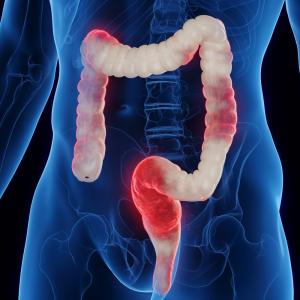Colorectal Cancer Is on the Rise in Younger Populations. Here’s What Everyone Should Know.

CREDIT: GETTY/Natalia Gdovskaia
For years, colorectal cancer was dismissed as something that only older men needed to worry about—with yearly colonoscopies filed under “nuisance aging items” right along with it. Yet despite lowering the recommended age at which adults of average risk for colorectal cancer should begin routine screening—down to 45 from 50—a worrying trend has endured.
That is, colorectal cancer rates have continued to rise in patients 55 and younger since as far back as the mid-1990s. And now, new data released by the American Cancer Society show that colorectal cancer has become the leading and second leading cause of cancer death in men and women under age 50, respectively.
However, NYU Langone gastroenterologist Aasma Shaukat, MD, MPH, says there’s plenty patients can do to shift those odds. “The 5- or 10-year survival rate is nearing 100 percent [for early-stage disease], so it’s a curable cancer if found in its earliest forms,” she explains.
We sat down with Dr. Shaukat and Peter S. Liang, MD, MPH, an assistant professor specializing in colorectal cancer prevention research at NYU Grossman School of Medicine, to discuss colorectal cancer, from signs and symptoms to prevention and outcomes.
Rectal and Colon Cancer Symptoms
Too often, there are simply no symptoms of colorectal cancer—especially when the disease is in its most treatable stages. “By the time you get symptoms it starts getting late in the game, so we want to catch it early,” explains Dr. Shaukat.
That said, Dr. Shaukat and Dr. Liang offer the five most common symptoms of colon and rectal cancers patients should be aware of:
- rectal bleeding
- abdominal pain
- anemia
- a sudden change in bowel habits
- decreased appetite
Of these, there’s one symptom Dr. Shaukat says younger patients should be especially vigilant about: “Rectal bleeding is often ignored because it can be attributed to hemorrhoids, which it could be, but we also don’t want to miss colon cancer—especially because it’s on the rise in younger individuals.”
Likewise, Dr. Liang stresses the importance of addressing concerns with your medical provider rather than dismissing them. “It’s important you don’t ignore these symptoms and that you speak to a medical professional to see if you need additional evaluation.”
Can Colorectal Cancer Be Prevented?
Fortunately, Dr. Liang and Dr. Shaukat say there are several ways to prevent or lower your risk for colorectal cancer. These are some of the most important:
- get screened
- know your family history and other nonmodifiable risk factors, and get screened accordingly
- stop smoking
- maintain a healthy lifestyle (e.g., exercising; eating a diet high in fiber, fruits, and vegetables; and limiting your intake of red meat)
The benefits of these measures extend beyond colorectal cancer, says Dr. Liang. “Eating a healthful diet, physical activity, and not smoking will reduce your risk of colorectal cancer as well as a number of other cancers and cardiovascular diseases.”
When it comes to nonmodifiable risk factors, he adds, “The risk factors for colorectal cancer are the same for everyone, but certain groups are more likely to be diagnosed with the disease, especially at an advanced stage.” Among those groups are people over the age of 50, men (an estimated 53 percent of cases in 2024), and Black, American Indian, and Alaskan Native people.
Screening for Colorectal Cancer
The good news is there are tools like colonoscopy to help screen for—and in some cases remove—precancerous and even cancerous lesions in their earliest stages. “A lot of the time, depending on how early we catch colorectal cancer, we can actually completely remove it endoscopically, sparing the patients from further surgeries,” says Dr. Shaukat. This, she adds, makes starting screening early all the more important.
And while current guidelines recommend routine screenings beginning at age 45 for those at average risk, for those with increased risk factors, like a family history of colorectal cancer, the time to start may be much sooner. “If we do get the right family history, we actually start screening as early as age 40 or sometimes even younger than that,” says Dr. Shaukat.

